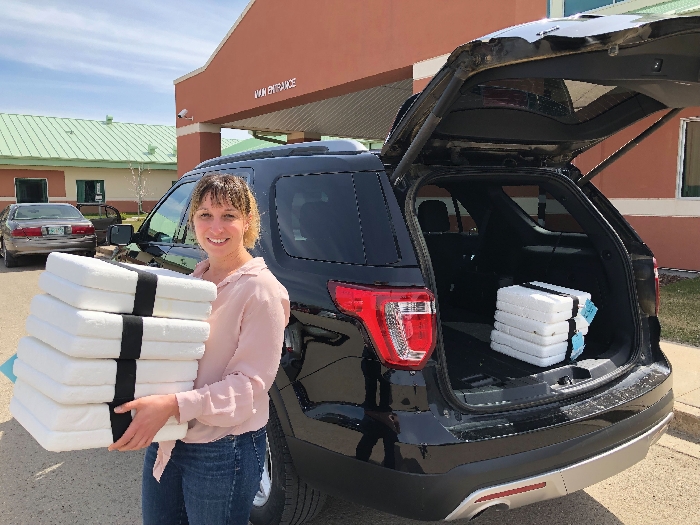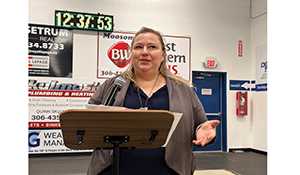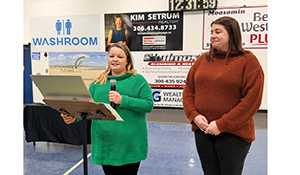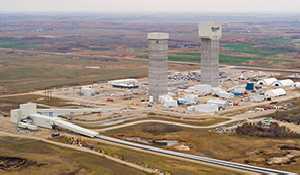Meals on Wheels in need of volunteers
July 14, 2020, 9:09 am
Rob Paul Local, Journalism Initiative Reporter


Meals on Wheels is a volunteer based program that provides cooked meals to those in need with at home deliveries, and with the Covid-19 pandemic the program is as important as ever.
Like everything else, Covid-19 has forced Meals on Wheels to make some changes due to safety. One of those changes was restricting volunteers who are over the age of 65 because they’re at higher risk of Covid-19.
The Chief Medical Officer for Saskatchewan requested the SHA to not allow any volunteers over the age of 65 which has put them in a difficult spot and it’s unknown as to when this restriction will end.
With the restriction, SHA Volunteer Services has lost up to 80 per cent of their Meals on Wheels volunteers and it has had its largest effect on rural communities. In many rural communities, SHA staff have been able to provide the service, but with Saskatchewan reopening and SHA services resuming, those staff members are needed to return to work and won’t be able to deliver meals.
SHA Volunteer Services is asking all volunteers, specifically in rural communities, to reach out to family and friends between the ages of 18-64 to see if they would be willing to volunteer to deliver Meals on Wheels. For those interested in volunteering, they’re asked to reach out to SHA Volunteer Services Coordinator Laurrie Royan at 306-766-2621 or laurrie.royan@saskhealthauthority.ca.
Rural communities specifically in need:
Southey
Imperial
Balcarres
Fort Qu’Appelle
Broadview
Grenfell
Indian Head
Montmartre
Moosomin
Whitewood
With people over the age of 65 being primary volunteers in rural communities, SHA Volunteer Services is trying their best to find younger volunteers while the public health order is in place.
“The restriction still stands because that’s the public health order,” said Royan. “We’re trying to recruit people between the ages of 18 and 64 until that public health order is lifted and we can have our other volunteers resume.
“With all of our rural communities, most of our volunteers are over 65. It’s really impacting our rural areas specifically. We’ve managed to find enough of our existing volunteers in the urban centres—they would have normally been in hospitals or long-term care facilities—to come help with delivering meals. In the rural communities Meals on Wheels is the only service that they’re providing and many of those volunteers are over 65. So SHA staff have been delivering in the rural communities.”
With the majority of people under 65 in rural communities busy between work and home life, Royan says, it’s much harder to find volunteers in these areas and there’s not much they can do about it.
“It’s just unfortunate that most of our volunteers in the rural areas are over 65,” she said. “It’s just dynamics in rural areas are a little different. 65 is still young and anybody under 65 in the rural tends to wear multiple hats either in the home or outside of the home. Having that public health order in place limits the availability of volunteers that could help us.
“The SHA is following all direction from the public health order,” she said. “We’re hoping in the near future that the public health order could be lifted and then we could welcome some of our volunteers back into helping out, but until then our hands are tied. We sent a memo asking volunteers if they have family or friends that would be able to assist with delivering meals at this time.”
Although Saskatchewan is reopening, there’s no timeline for the volunteer restriction to end, says Royan, and that’s why they want to get word out there that they need help.
“We have no clue when this restriction will be lifted,” she said. “It’s basically just wait it out and continue doing what we’re doing, but we wanted to reach out for more volunteers as well. If there are people who could help right now, whether they’re post-secondary students off for the summer and couldn’t find work or people that might be in that age category with free time that could assist us, we figured it’s worth a shot to ask.”
With some post-secondary students struggling to find work due to Covid-19, Royan says, there’s an incentive to volunteer with them beyond knowing they’re helping the community.
“As long as kids are over 18 we welcome them to apply online and for the post-secondary students that couldn’t find work this summer, if they volunteer there’s up to a $5,000 grant that they can be given. In lieu of employment if they volunteer with us then they qualify for that grant.”
SHA Volunteer Services Director Bernie Doepker says, they don’t know when the volunteer age restriction will end because the Covid-19 pandemic is unpredictable.
“We don’t know exactly when that will end,” she said.
“It is part of the public health order. Right at the beginning, because of the severity of people over 65 who have maybe multiple chronic conditions and how they may suffer worse symptoms, that was put in place. We know people across the global with multiple conditions are suffering more from the virus than people who don’t have chronic conditions. That’s why the restriction was put in place, asking volunteers who are over 65 to take a step back.
“Whether that is going to change in the coming weeks or months, we don’t know, but we do know that we are expecting a second wave and we would still like to keep our vulnerable population as safe as we can. Even if the restriction is lifted, it would still be up to the volunteers if they want to resume or if they’d feel safe after a vaccine is available. That’s why we’re really trying to increase our volunteer base for the foreseeable future.”
Losing the vast majority of their volunteers hurt, but Doepker says, they were able to compensate for the first few months with other staff, but as other SHA services return, they need volunteers.
“I would say it’s a good 80 per cent (of lost volunteers) for sure,” she said. “What happened when those public health orders came in and the province of Saskatchewan asked us to really be careful, what happened was a lot of services were put on hold within the SHA in order to deal with what we were thinking might be coming.
“That didn’t transpire so what we did was, when staff members didn’t have maybe all of the programs running at the beginning of March and April, we looked at all of our Meals on Wheels programs across the province and we changed a little bit of the process to try and maintain that safe distance and to increase protocols, processes, and screenings of volunteers who are going to deliver those meals.
“We did have a base and got some early volunteers signed up right at the beginning with people that were off work and people who knew there was a need,” she said. “That’s how we managed for the first few months. Now we’re finding that as services are being resumed in all of our facilities and programs, the staff are all being called back to their regular duties and the volunteers who had signed up and were assisting with these programs are now not able to keep up to the demand with the increased need. That’s why we have a number of communities across the province that we’re looking for anybody who is available and willing to assist with this. In some towns it might be just a few meals, but in some larger places it might be 10 or 12 meals that you’d be asked to deliver.”
“When home care was first started in the province—it was in the early 80s—one of the services that was offered was Meals on Wheels,” she said. “It was to provide a nutritious meal to people who were unable to manage that on their own, but were still living independently in their homes. In order to keep that independence and stay there, it was one of the options they were eligible to receive. In a small town you might only have two or three or four people that might be on Meals on Wheels, but in a larger town you might have 20 or 30. It’s about coming to help in your community.”
With the Meals on Wheels clients being more vulnerable to Covid-19, it forced them to make major adjustments to their delivery process to ensure safety.
“The local volunteer co-ordinators would go through an orientation and training in all of the things that would need to be involved in delivering Meals on Wheels to clients and following all the screening processes,” she said. “When you are working in any healthcare facility in the province, right now, we’re being screened for our temperature, asked if we’ve been in large gatherings or left the province, and whether we feel unwell in anyway before we can go into work.
“Volunteers would do that same screening. Then they would pick up the meals and follow training with extra precautions wearing PPE’s and hand washing and follow protocols that are needed between each client. We changed how we deliver in order to maintain the physical distance between volunteers and clients. Instead of knocking on a door and going into the home to deliver meals, we’re delivering them to the front door and having a conversation at six to eight feet apart with the client to see how they’re doing and to make sure they’re okay and letting them know the meal is okay for them to take inside to their table.”
Doepker says, this is an opportunity for post-secondary students to help out their community over the summer.
“There is a grant available for post-secondary students,” she said. “It’s not part of the SHA or provincial program, but it’s a federal program that if they’re volunteering they’re eligible to get some grants for their next school semester.
“As universities resume, I know a lot of them are going to online classes so maybe some people will stay in their home communities and really this is a commitment of an hour or maybe a little more. It’s done at noon everyday and it’s a way to give back to the community and also a chance to get out of the house for people working from home.”
“What happens is, you do need to go through a screening process, the same that you would with any other volunteer program whether it’s in a school or a church,” she said. “We do a criminal record check and the vulnerable sector check because they are providing a service to a vulnerable population within their community.
“They can contact their local Meals on Wheels coordinator or follow a link (https://app.betterimpact.com/Application?OrganizationGuid=cd025332-9892-45ca-bfef-9a8743d9cf1b&ApplicationFormNumber=1) to register online,” she said. “Then they can start the process.”



































